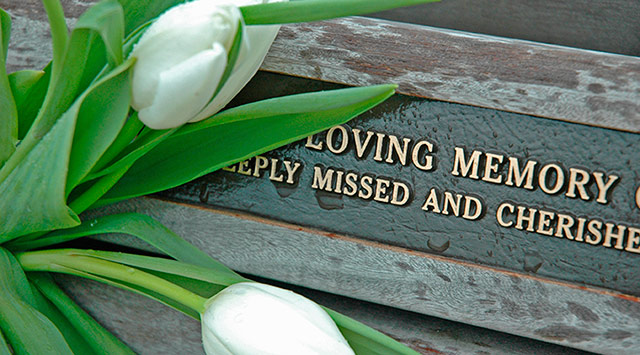Obituaries
Planning Your Obituary
Obituaries are a common way to announce a recent death to your community. They highlight the deceased’s accomplishments, list survivors and inform readers of any public memorial services.

Obituaries: How to Get Started
Work with your funeral home to see what obituary services they offer: Funeral homes will often write an obituary based on a questionnaire completed by the family, either included as part of their services or for an additional fee. They can guide you through local newspapers’ requirements for publication.
Determine where the obituary will be published: Local newspapers are a common place to have obituaries published and most require payment. Obituary packages often include publications in online versions of the newspaper.
Funeral homes often publish obituaries directly on their own websites. Some online obituary websites will aggregate obituaries from national newspapers as well.
Understand each newspaper’s obituary requirements: Each media outlet will have set guidelines for death announcements. If you’re planning to write your own, investigate what your publication requires.
For example:
- Length: Some newspapers charge by the length of the obituary, while other charge a flat rate.
- Writing: Some newspapers write obituaries according to their own standards. In nearly all cases, newspapers will edit the obituary for spelling, grammar and format.
- Price: Gather information about price before deciding on which publications you’ll use.
- Deadlines: Publishing an obituary several days before services allows for time for attendees to make arrangements if viewings, services or burials are open to the public.
Does your local newspaper also run paid ‘death notices’? These paid placements generally include fewer biographical details, but include specifics about the memorial services. Traditionally, obituaries are editorial pieces about select individuals that are written by newspaper staff. You can contact your local newspaper and suggest they write a specific obituary, but the decision is made by the newspaper.
What to Include in Your Obituary
Decide what biographical information you’d like to include in your death announcement so your loved ones won’t have to search for information and make decisions about what to include after your death. In addition to asking your funeral home about writing your obituary, record the following for your family:
- Whether you’d like to include cause of death in your announcement
- Any charitable organizations for memorial donations (and whether those will be requested in lieu of flowers)
- Date and location of your birth
- Any previous cities you’ve lived
- Schools attended and degrees obtained
- Date and location of marriage
- Military service, including commendations
- Career information
- Awards or other accolades
- Volunteer service or organizations you’re involved in
- Any other interests, hobbies or noteworthy details
Back to Planning Center
More Funeral & Memorials Resources
Related Posts

Family Dynamics: Navigating End-of-Life Planning with Loved Ones
Talking about end-of-life planning with family can be tough. Different opinions, emotions, and family dynamics often come into play, sometimes leading to misunderstandings or even conflicts. In this post, we’ll explore how family dynamics can influence the planning process and share some practical tips for making it a little smoother.

Embracing the Inevitable: An Introduction to Modern Death Etiquette
Death is an inevitable part of life, yet it's a topic many of us shy away from discussing. In our digital age, thoughtful end-of-life planning is more crucial than ever. Inspired by personal experiences, my book "Click Here When I Die" aims to guide you through modern death etiquette, simplifying the process for your loved ones when the time comes.

The 5 most stressful financial concerns for pre-retirees
If you’re thinking about retiring, you may be facing fears of being able to survive on a limited, fixed income, in a world where everything is gradually becoming more expensive.

7 Reasons Why You Should Make or Update Your Will this August.
Wills are one of those things in life that everyone knows they need, yet somehow seem to procrastinate when it comes to getting it done.